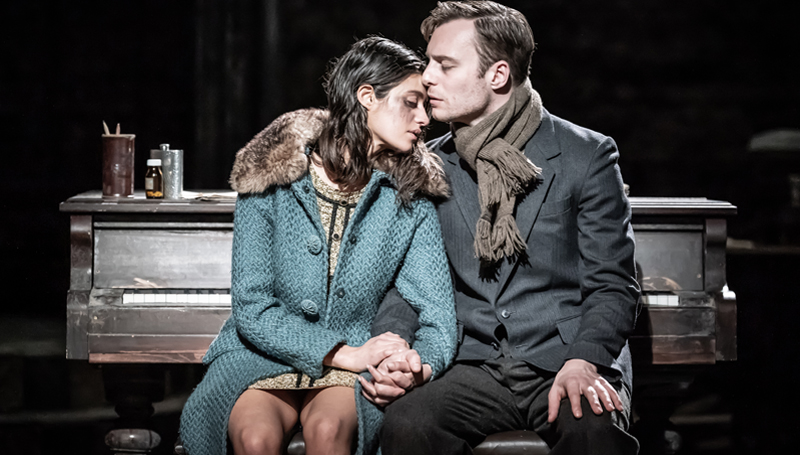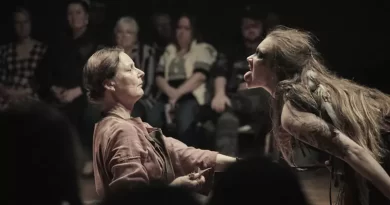“Cold War” at Almeida Theatre
Jeremy Malies in north London
18 December 2023
Cold War is an adaptation by Conor McPherson of Paweł Pawlikowski’s 2018 historical drama film which features folk music from the movie as well as new songs by Elvis Costello. Although McPherson created a spellbinding story using the folk-based songs of Bob Dylan in Girl from the North Country a few years ago, Cold War, by contrast, smouldered in an interesting (always promising) way but never ignited for me.

Alex Young and Luke Thallon.
Photo credit: Marc Brenner.
The opening scenes made the most impression as musicologists/cultural anthropologists Kaczmarek (Elliot Levey) and Irina (Alex Young) travel through the Soviet Union satellite state that was Poland in the years shortly after World War Two. They are forming a concert party, seeking out singers and dancers who smack of authentic culture and can be shown to be flourishing under the avuncular care of Joseph Stalin. (The verdict on living standards during communism perhaps lies in the detail that you join the music group only after delousing.)
A poster of Uncle Joe in a heroic realism style initially dominates a stately home in Jon Bausor’s set which proves varied, evocative, and occasionally colourful despite the grey and black palette that director Rupert Goold opts for in keeping with Pawlikowski’s film.
There are auditions in the church (a barked “Next!” for unsuccessful auditionees is a given from Broadway to the Carpathians it seems) and we meet principal love interests Wiktor (Luke Thallon) and Zula (Anya Chalotra). Zula, who has grown up in an environment where you sleep with a knife under your pillow, is lucky not to be in jail for attacking a relative and is now in last-ditch territory in terms of improving her life by being accepted for the troupe. Wiktor is a pianist-composer who barely writes a note during the 2 hours 45 minutes (with interval) storyline, and Thallon is at his best when describing composer’s block which will only allow him to arrange the work of others.
Wiktor (we must accept) is a magnet for the opposite sex, and before pairing off with Zula he will ditch Irina with whom (in my judgement) he seems to have the most chemistry. During the on-off relationship with Zula, he finds time to marry Juliette (Anastasia Martin) who is a dreadful Paris-based American poet. A strong scene in Goold’s linguistically forensic direction has Zula not just parse the lyrics of a song by her rival Juliette that she is being asked to sing (it becomes Costello’s “Favourite Hour”) but explain what is and what is not a metaphor. Zula proceeds to rewrite the words and Chalotra proves her versatility by sitting down at the piano (generally used by Wiktor) and accompanying herself as she sings.

Luke Thallon as Wiktor.
Photo credit: Marc Brenner.
Scenes in a recording studio have the same naturalness and you believe in every character as they express both aesthetic and technical judgements on what is happening in the recording process. The folk singing defies any preconceived notions and is even contrapuntal at times. Paule Constable’s lighting (occasional use of candles) is painterly, and I was most struck by how the dancers while at rest in a corner of the church resembled a group oil portrait seen through the burnish of stained glass.
It may have been the distance of the orchestra loft, but I fancied that musical director Jo Cichonska deliberately takes the beat out of Costello numbers such as “Silent Child” in order to bring melody and words to the forefront. Songs are never set pieces; they are part of the characters’ narrative arcs and Goold will have wanted them to be an integral element of plot.
Similarly, there is no overall self-conscious sound. The songs see characters at a specific time (perhaps vacillating over whether to defect across the Berlin Wall) articulating what they think or believe they are expected to think by a totalitarian government. Towards the end, Chalotra must be perceived to sing one song badly because her character is abusing prescription drugs. If she had not excelled earlier, one might have been left wondering about her technique.
The dancing is never mannered, and with one of the settings for this being a Paris nightclub, choreographer Ellen Kane does well to avoid anything obvious. The folk dances are dainty not galumphing and Kane even manages to keep a freshness to “Rock Around the Clock”. Similarly, there is not a hint of cod Eastern European, French, or German pronunciation and every company member speaks in their resting accent.
It was Almeida regular Levey who captured my interest for the virtuosity of the acting (no seeming gap between script and utterances) as well as character development as he progresses from cynical talent scout for the Party to mid-ranking official, theatrical agent, and promoter.
I’m about to watch the film but chose to judge the play (as I think it should be judged) in terms of an independent piece of work. What is it with Goold and film adaptations? His version of the Thomas Vinterberg film The Hunt in an adaptation by David Farr proved a pitch-perfect project at the Almeida in 2019 and transfers to St Ann’s Warehouse, New York, in February.
Ultimately, this project will work if you feel the harmonies of Polish folk music sit with a symphonic tradition, solfège, Costello’s own mournful ballads, and the snatches of Chopin that we hear, these last being problematic since he had a foot in two of the camps. I’m not sure it all melded (not to mention the Bill Haley) and I certainly was not transported by the central love story. I could also have done with a few more laughs. The concluding episodes reminded me of the weaker summing-up scenes in Tom Stoppard’s Leopoldstadt. Despite the many examples of excellence, I left unconvinced, uninvolved, and underwhelmed.









